Best Practices on Tackling the SDGs
The Lebanese American University (LAU) actively participates in international collaboration and research aimed at reviewing comparative approaches and developing best practices for addressing the UN Sustainable Development Goals (SDGs). This is reflected in its multidisciplinary research efforts, partnerships, and knowledge-sharing initiatives that encompass all 17 SDGs. These initiatives highlight LAU’s commitment to global cooperation and leadership in tackling the SDGs through innovative research and best practice development. Examples of these partnerships could be find below:
Combating Food Waste for Food Security:
LAU collaborated with the American University of Beirut (AUB) and the UN Environment Programme to address food waste in Lebanon, an issue affecting over 65% of the population due to food insecurity. This effort included a panel discussion and research presentation on food waste reduction strategies, highlighting cross-institutional collaboration to achieve SDG 2 (Zero Hunger) and SDG 12 (Responsible Consumption and Production).
Combating Food Waste for Improved Food Security in Lebanon
September 29, 2022
https://eventscal.lau.edu.lb/event.php?evt=20220830_combating-food-waste-for-improve
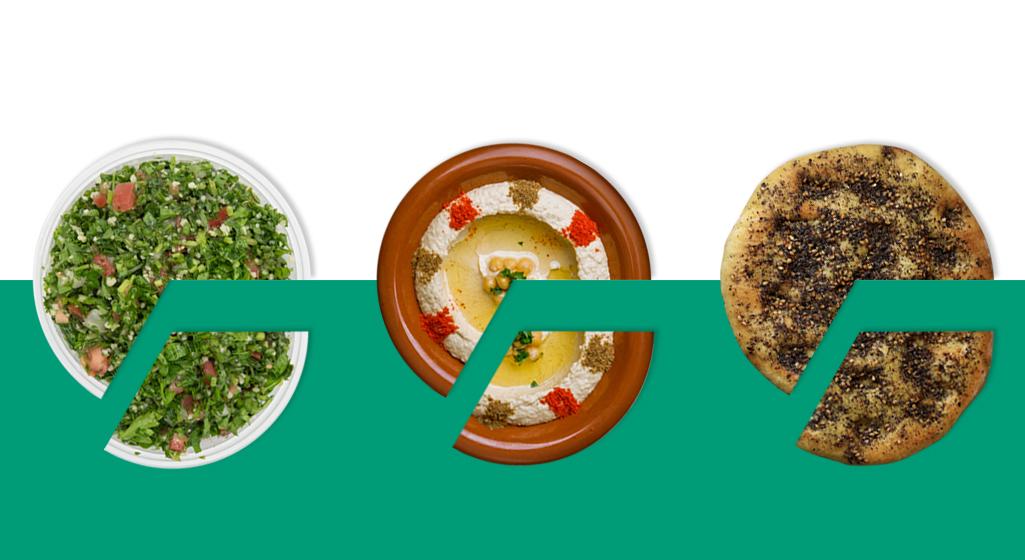
On the occasion of the International Awareness Day of Food Loss and Waste, LAU’s Nutrition Program and AUB’s Department of Nutrition and Food Sciences are organizing a panel discussion entitled: “Combating Food Waste for Improved Food Security in Lebanon”
Based on research done by LAU and AUB experts in this field, in Lebanon, we waste one third of the food we produce. More than 65% of the population are food insecure. The panel discussion focused on the food wasted during consumption in houses, supermarkets and the hospitality sector.
Main speakers:
- Mohamad Abou Haidar, Director General of the Ministry of Economy and Trade
- Paolo Marengo, International Specialist - Resource Efficiency and Sustainable Consumption and Production, UN Environment Programme
- Mohamad Abiad, Professor of Food Science, American University of Beirut
- Hussein Hassan, Associate Professor of Food Science and Technology, Lebanese American University
The experts highlighted the research findings by LAU and AUB researchers on food waste. They also discussed the efforts and the proposed interventions by different stakeholders to reduce food waste.
Publication on International Collaboration Impact:
A recent study by LAU researchers explored how international collaboration influences publication impact, showing how global partnerships enhance research outputs. This has emphasized the importance of international academic network:
Faculty and MA Economics Students Joint Publications
https://sb.lau.edu.lb/academics/departments/economics/faculty-publications/faculty-ma-students.php
- Alamah, Z., Fakih, A. (2024). Is the Price of Ether Driven by Demand or Pure Speculation?, Computational Economics, 1-25.
- Fakih, A., Sleiman, Y. (2024). The Gender Gap in Political Participation: Evidence from the MENA Region. Review of Political Economy, 36(1), 154-177.
- Fakih, A., Kassab, S., & Lizzaik, Z. (2024). Employability of Syrian refugees in Lebanon: the role of legal residency. Defence and Peace Economics, 35(8), 1028-1045.
- Karaki, M. B., & Neaimeh, A. (2024). Do higher global oil and wheat prices matter for the wheat flour price in Lebanon?. Agricultural Economics.
- Fakih, A., El Chaar, J., El Arissy, J., & Kassab, S. Z. (2024). Governance quality and the labor market in the MENA region post-Arab Spring. International Journal of Social Economics.
- Alamah, Z., Elgammal, W., & Fakih, A. (2024). Does twitter economic uncertainty matter for wheat prices?. Economics Letters, 234, 1-6.
- Kassab, S. (2024). The Impact of Remittance Inflows on Inflation: The Case of Lebanon. Review of Middle East Economics and Finance, 20(1), 113-127.
- Diab, A., & Fakih, A. (2024). Determinants of Happiness Among Arab Youth: Evidence from a Youth Survey. SAGE Open, 14(1), 1-13.
- Ahmad, I. A., Fakih, A., & Hammoud, M. (2023). Parents’ perceptions of their children’s mental health during COVID-19: Evidence from Canada. Social Science & Medicine, 337, 11629.
- Karaki, M. B., & Safieddine, H. (2023). Do defense news crowd out private investment?. Economics Letters, 111421.
- Diab, S., & Karaki, M. B. (2023). Do increases in gasoline prices cause higher food prices?. Energy Economics, 107066.
- Baltaji, R., Fakih, A., & Sayour, N. (2023). How did COVID lockdowns affect firms and workers? Evidence from Jordan and Morocco. Development Policy Review, 41(6), 1-23.
- Boutros, P., Fakih, A. (2023). The Disability Employment Paradox in Developing Countries: Recent Evidence from Lebanon, Development Studies Research, 10(1), 1-16.
- El Baba, W., & Fakih, A. (2023). COVID‐19 and consumer behavior: Food stockpiling in the US market. Agribusiness, 39(2), 515-534.
- Boutros, P., Fakih, A., & Tarraf, M. (2023). Adapting to the New Normal: The Impact of Remote Work on Firm Performance in Jordan and Morocco. Regional Science Policy & Practice, 15(8), 1722-1740.
- Fakhoury, A., Fakih, A. (2023). Government Intervention and Business Response as Determinants of Business Continuity amid COVID-19: The Case of Jordan and Morocco. International Journal of Economic Policy in Emerging Economies, 17(2), 196-219.
- Fakih, A., & El Baba, M. (2023). The willingness to emigrate in six MENA countries: The role of post‐revolutionary stress. International Migration, 61(4), 201-220.
- Hashem, I., & Marrouch, W. (2023). Polluting resource extraction and climate risk. Natural Resource Modeling, 36(1), 1-9.
- Alamah, Z., AlSoussy, I., & Fakih, A. (2023). The Role of International Research Collaboration and Faculty Related Factors in Publication Citations: Evidence from Lebanon. Economies, 11(3), 90.
- Bouri, E., Hammoud, R., & Kassm, C. A. (2023). The effect of oil implied volatility and geopolitical risk on GCC stock sectors under various market conditions. Energy Economics, 120, 106617.
- Fakih, A., & Khayat, R. (2022). Social identity, confidence in institutions, and youth: Evidence from the Arab Spring. Social Science Quarterly, 103(5), 997-1018.
- Baki, G. A., & Marrouch, W. (2022). Environmental taxation in the Bertrand differentiated duopoly: New insights. Resource and Energy Economics, 70, 101329.
- Boutros, P., Fakih, A., Kassab, S., & Lizzaik, Z. (2022). Does the Number of Publications Matter for Academic Promotion in Higher Education? Evidence from Lebanon. Social Sciences, 11(10), 454.
- Al Gharib, F., & Marrouch, W. (2022). Central air conditioning, air pollution and housing location: evidence from Lebanon. International Journal of Housing Markets and Analysis, 16(5), 979-990.
- Boutros, P., Fakih, A. (2022). Drivers of Research Outcomes in Developing Countries: The Case of Lebanon. Economies, 10(3), 58.
- Fakih, A., Haimoun, N., Sleiman, A. (2022) What Drives Demand for Private Tutoring in the MENA Region? Evidence from a Youth Survey. African Development Review, 34(2), 268-279.
- Abdo A., I., Fakih, A. (2022) Does the Legal Form Matter for Firm Performance in the MENA Region? Annals of Public and Cooperative Economics, 93(1), 205-227.
- Barakat, Z., Fakih, A. (2021) Determinants of the Arab Spring Protests in Tunisia, Egypt and Libya: What have we learned? Social Sciences, 10(8), 282.
- Baalbaki, R., Marrouch, W. (2020). Is there a garbage Kuznets curve? Evidence from OECD countries. Economics Bulletin, 40(2), 1049-1055.
- Fakih, A., Ghazzawi, N., Ghazalian, P. (2020) The Effects of Power Outages on the Performance of Manufacturing Firms in the MENA Region. Review of Middle East Economics and Finance, 16(3), 1-28.
- Marrouch, W., Mourad, J. (2019). Effect of gasoline prices on car fuel efficiency: Evidence from Lebanon. Energy Policy, 135, 111001.
Memberships in international networks:
Moreover, many LAU faculty members are members of international networks such as:
- Dr. Nadim Farajalla is on the managing community of BluePeace:
https://bluepeaceme.org/en/meet-the-community
Blue Peace Middle East is a non-governmental regional initiative that aims to strengthen cooperation over water across borders, sectors and generations.
Working with senior water experts, academics, politicians and journalists among others, the initiative is dedicated to improving the region’s water, food and energy security and preserving ecosystems in a changing climate.
Blue Peace ME is the first initiative of its kind in the Middle East. As a regionally owned dialogue platform, it has made it its mission to transform water from a potential source of conflict into an instrument for cooperation and peace.
With partners in Iraq, Jordan, Lebanon and Türkiye, the initiative uses dialogue, capacity building and concrete action to realise its vision of using the power of water to build a peaceful future for the region.
- Dr. Nadim Farajalla is also a member of The Accelerator for Systemic Risk Assessment (ASRA).
https://www.asranetwork.org/who-we-are
ASRA is a unique initiative catalyzing the development of practical tools decision-makers need to effectively cope with and navigate polycrisis. We are home to a global network of transdisciplinary experts and thought-leaders who are radically rethinking risk in order to improve policy and decision-making to the benefit of nature and humanity.
- Dr. Bahia Abdallah from the School of Nursing is currently representing LAU as an associate member in the Global Breastfeeding Collective.
https://www.globalbreastfeedingcollective.org/
The Global Breastfeeding Collective are calling to solicit membership applications to the Collective, a partnership of prominent international agencies, including WHO and UNICEF, calling on donors, policymakers, philanthropists, and civil society to increase investment in breastfeeding worldwide.
They want to expand their membership to include regional and country-led civil society breastfeeding organizations from low and middle-income settings to apply to become associate members. Associate members are welcomed to many of their monthly meetings, where they address critical issues affecting the seven policy calls to action and contribute to the global dialogue on breastfeeding advocacy with the Collective’s standing members.
The Arab Institute for Women (AiW) Events:
Through its work, the AiW indirectly reviews the approaches on tackling SDGs. The AiW organized the following events:
Regional Workshop: “Women’s Political Participation in the Arab Region”
https://aiw.lau.edu.lb/news-events/activities/regional-workshop-womens-politic.php
On February 28, 2023, The Arab Institute for Women (AiW), in collaboration with the Arab Network for Democratic Elections (ANDE) and the International Institute for Democracy and Electoral Assistance (IDEA), hosted a regional workshop titled “Women’s Political Participation in the Arab Region” to discuss the most recent developments related to women’s engagement in political life in Egypt, Tunisia, and Lebanon.
Athena40-5th Global Conversation: “Innovation, Change, & Education for Women in the Digital Age
https://aiw.lau.edu.lb/news-events/activities/athena40-5th-global-conversation.php
On March 8, 2023, to mark International Women’s Day, The Arab Institute for Women (AiW), in collaboration with Athena40, hosted the Beirut panel for the 5th Global Conversation themed “Innovation, Change, and Education for Women in the Digital Age” and connected simultaneously with cities across the globe, like Amman, London, Karachi, and Malmo.
International Women’s Day: “Gender Equality and Technology: Women’s Inclusion in the Digital World”
https://aiw.lau.edu.lb/news-events/activities/international-womens-day-gender-.php
On March 6, 2023, The Arab Institute for Women, in collaboration with the Armenian General Benevolent Union (AGBU), hosted a panel discussion under the title: “Gender Equality and Technology: Women’s Inclusion in the Digital World”. The discussion focused on the gender divide in the digital world, the role which women play in technology, the difficulties endured by these women, and the many ways available to use the virtual space as a tool to promote women’s rights and gender equality.
Webinar: “Gender and the Environment”
https://aiw.lau.edu.lb/news-events/food4thought/webinar-gender-and-the-environme.php
On February 13, 2023, as part of the Food 4 Thought speaking series, The AiW and the Middle East Partnership Initiative - Tomorrow’s Leaders Gender Scholars Program (MEPI - TLS) hosted a webinar titled “Gender and the Environment” to discuss the mutually reinforcing relationship between a sustainable environment and gender equality on one hand, and the impact of environmental degradation on the deepening of gender inequalities on the other.
Project: “Equality for Everyone: Gender Reform from Grassroots to Government”
The AiW completed the project: “Equality for Everyone: Gender Reform from Grassroots to Government” funded by the United States – Middle East Partnership Initiative (U.S-MEPI)’s which aimed at promoting universal parental leave and progressive childcare policies among Lebanese working parents as an entry point to achieving greater gender equality in Lebanon, while also promoting access to healthcare to disadvantaged women to overcome caregiving burdens. This innovative project targets parental leave policies within the private and public sectors, with a focus on policy change on the national level. The project also targets LAU as a pilot project for policy change regarding parental leave policies.
SOE Collaboration with Synopsys Gains Momentum

Forging ahead with an academic partnership, SOE Dean Michel Khoury and ECE Department Chair Dani Tannir recently met with Synopsys VP of Engineering Weikai Sun along with SiliconCedars founder Paul Tauk. The collaboration with Synopsys, a leading company in the electronic design automation of integrated circuits, will include assistance to the school’s programs through software tools, research and senior project support, in addition to potential internship and employment opportunities for students.
Collaboration with Unilever Opens Doors for Business Students
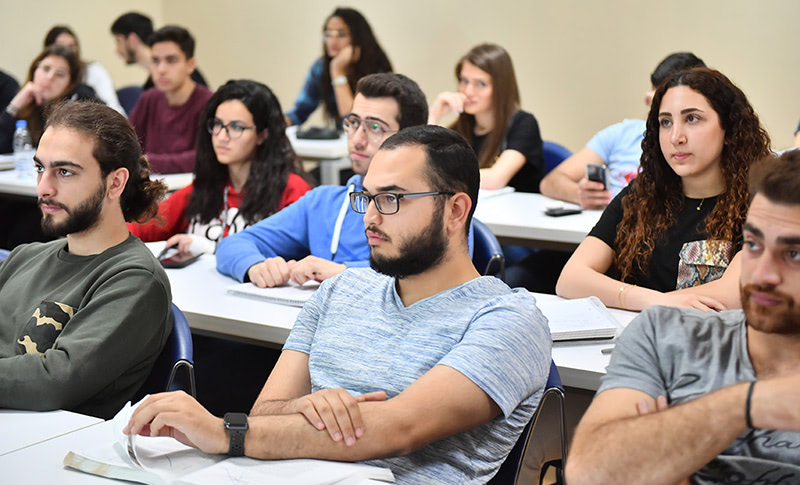
The Adnan Kassar School of Business has initiated a new collaboration with multinational giant, Unilever, on a senior marketing course project that would help expose students to the fast-moving consumer goods industry and earn valuable internships. The partnership follows similar opportunities available to LAU students across the board. The company had previously worked closely with LAU on several projects, among which the student-led national Case Competition.
International Collaborations Continue
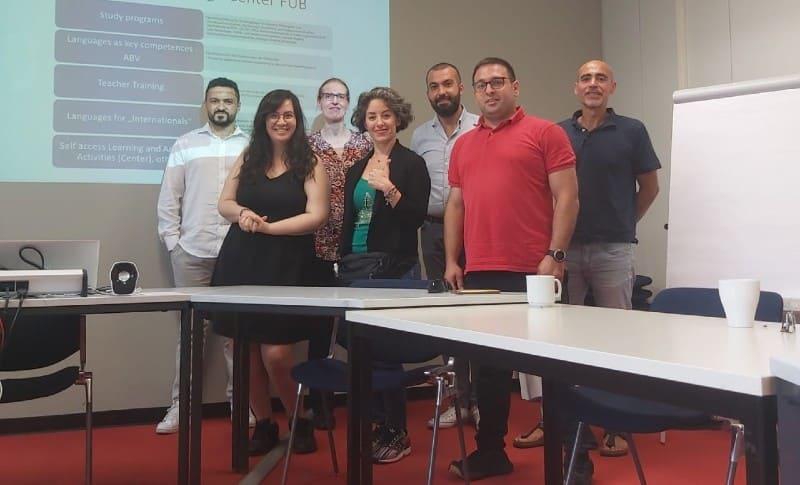
With more than 50 partner institutions across the world, LAU fosters and seeks out exchange and training opportunities for its faculty, students and staff. Recently, an LAU delegation visited Freie University of Berlin for an Erasmus+-funded mobility to exchange expertise and explore possibilities for collaboration. The group included Drs. Brigette Wex, Hussein F. Hassan, Hussein Hassan and Elias Akoury from the Natural Sciences Department, Dina Abdul Rahman from OIS and Joanna Fayad from AiW.
LAU and NYU Tisch Collaborate on Theatrical Production
Dr. Lina Abyad’s timely play, Amrika, was performed in New York by LAU and Tisch students.
 |
 |
For six weeks this spring, five LAU performing arts students took advantage of a golden opportunity to workshop and stage performances of Associate Professor of Theater Lina Abyad’s play Amrika with NYU Tisch School of the Arts, widely considered to be one of the leading arts schools in the world.
LAU and Boise State University Collaborate on Virtual Exchange Program
Lebanese and US students collaborate on innovative solutions, overcoming communication challenges.
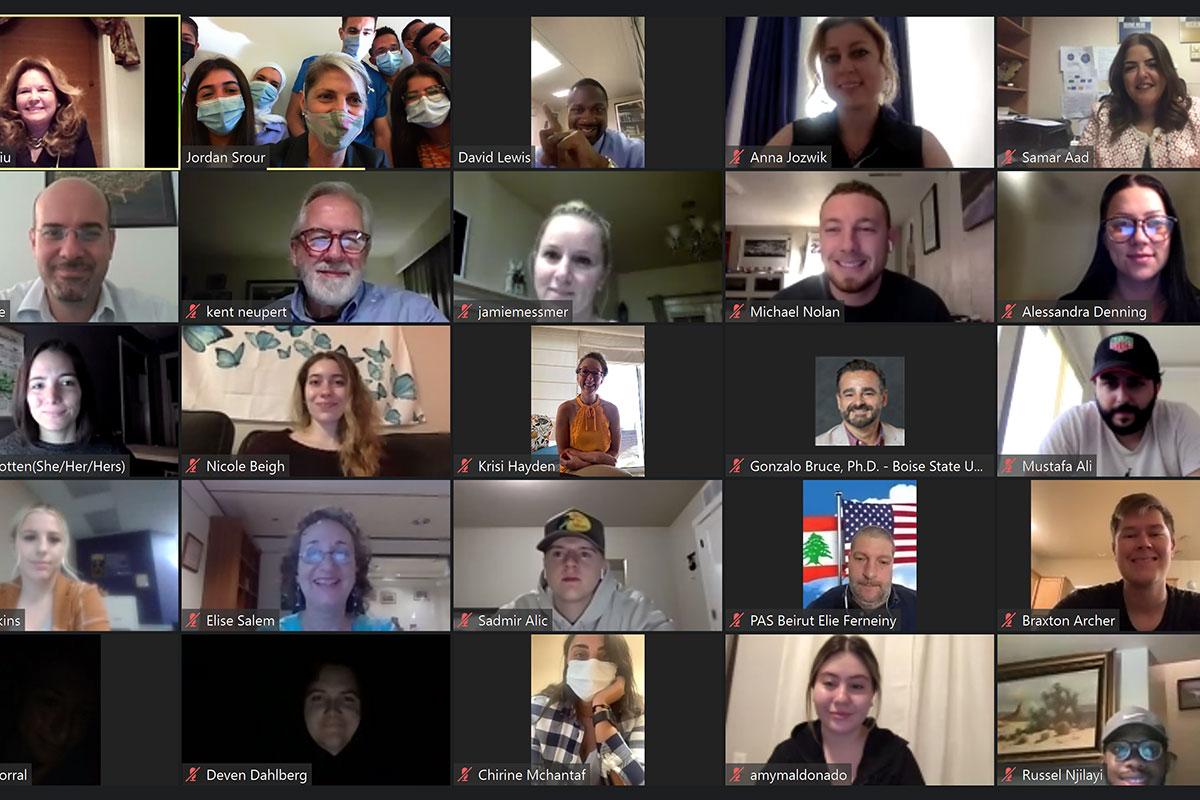
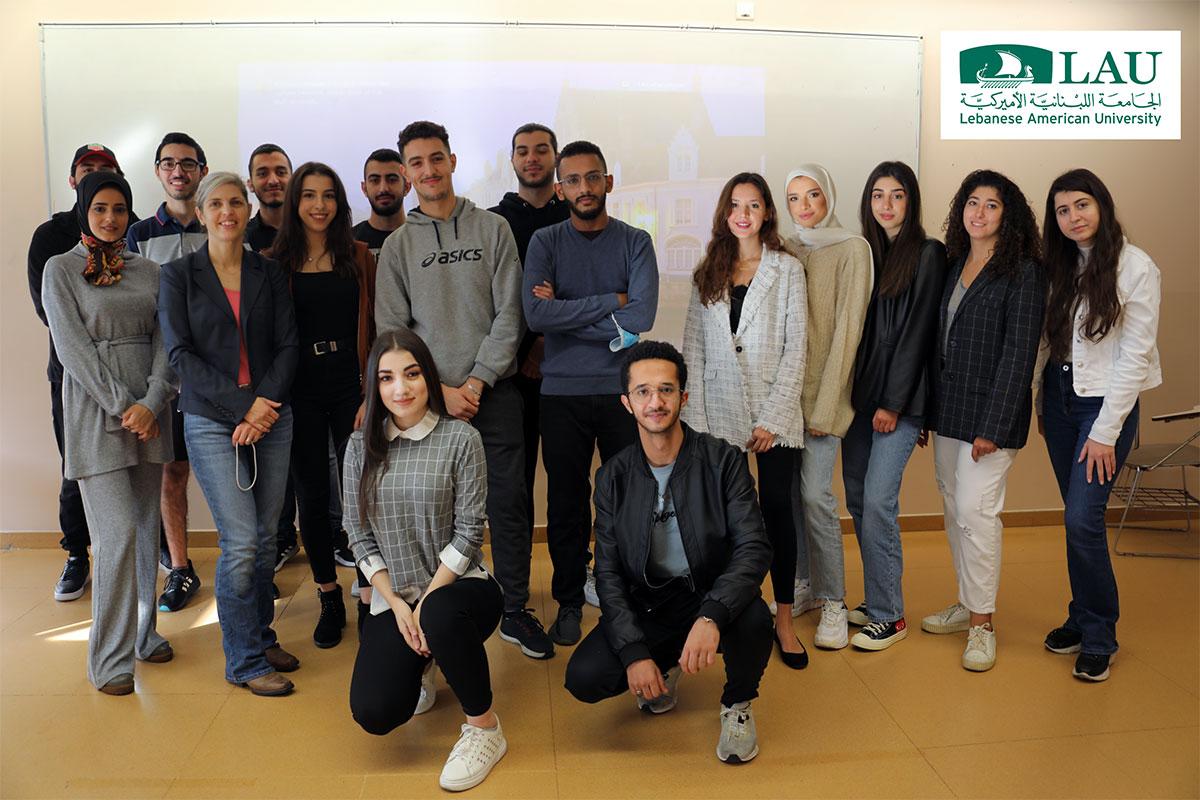
Students from LAU and Boise State University (BSU) embarked on a virtual exchange program funded by the US Embassy in Lebanon, turning difficulties into co-created, innovative solutions.
Through Flipgrid, an educational video app, 71 students worked on three projects aimed to engender cross-cultural dialog. The first of these projects was an ice-breaker activity whereby the students designed a new product/service for a grocery store. In the second, the students had to develop solutions to a problem that they imagined their cross-cultural counterparts were experiencing and then refined those innovative solutions by carefully listening to their counterparts’ comments.
Gender in Development and Humanitarian Assistance (GDHA) Certificate
Overview
In collaboration with The Arab Institute for Women (AIW) at the Lebanese American University (LAU), the Gender in Development and Humanitarian Assistance (GDHA) Certificate is a continuing education program designed for students, practitioners, and policymakers. The program addresses gender issues in development and humanitarian settings. GDHA innovatively incorporates academic knowledge with high-level expertise to create a new standard in gender education for development and humanitarian professionals. The standards are in-line with internationally-recognized practices. Moreover, the program builds local capacity to address local issues, building a cadre of motivated professionals in the Arab region.
Project: Violence Counts! Strengthening Arab Regional Capacity to Collect Data on Violence against Women
The AiW, in partnership with the Global Women’s Institute (GWI) at the George Washington University, received a grant in December 2020 funded by UN Women and the World Health Organization for the purpose of building the capacity of Arab experts to collect data on violence against women (VAW). Though quality, reliable data on VAW is essential for developing policies and interventions to achieve gender equality, a substantial gap remains in the collection of prevalence data on VAW in regions across the world, particularly in the Arab States. This gap is due to stigma regarding VAW, underreporting, lack of reporting mechanisms, difficulty accessing justice for survivors, lack of services and support, and other factors. This gap is also due in part to the technical capacity required to collect these prevalence data in accordance with global, methodological, ethical, and safety standards.
The AiW and GWI developed a training curriculum and implemented a pilot training within the context of this grant for the purpose of building the technical capacity of a selected number of Arab experts to collect these prevalence data on VAW. A secondary goal of this program is to widen the currently limited pool of researchers who can collect these data in a high-quality and ethical way. This will ensure that there is a wider base of Arab experts who are able to undertake data collection on VAW. Data is critical in strengthening prevention and response, and so The AiW aims to integrate this training curriculum within its sustainable development projects.
Project: Security Forces Training
The AiW, in collaboration with ACE, also secured a grant from the International Centre for Migration Policy Development (ICMPD) for a customized certificate focused on specific courses from the GDHA certificate. The three courses requested by the ICMPD focus on issues related to Women, Peace and Security, specifically the United Nations Security Council Resolution (UNSCR 1325), national action plans, and gender mainstreaming. Fifteen participants from the Lebanese security sector, including officers from the Internal Security Forces, the General Security, and the Lebanese Armed Forces received the training. Courses started on January 11, 2021 and ended on April 29, 2021. As part of the program, participants presented projects that they had prepared which all advocated for the implementation of institutional amendments to ensure that gender sensitive policies are set throughout the security sector.
Capacity Building for Law Enforcement Personnel on Gender-Based Violence Prevention and Response
IWSAW has launched a new project that focuses on building the capacity of law enforcement personnel to identify, prevent and respond appropriately to gender-based violence (GBV), and to increase gender awareness and equality within the security sector itself.
The full program, funded by the Dutch Embassy, is expected to last for two years and will entail in-depth training for female and male Lebanese security personnel on:
- Integrating gender perspectives into the provision of security service;
- Increasing women’s representation and participation in the security sector, international and national legal frameworks, policies, and procedures in cases of GBV;
- Overcoming challenges to gender equality and GBV prevention and response in the Lebanese context.
IWSAW strongly believes that a critical component of prevention and response to GBV is to work with security service providers alongside medical, legal and psychosocial personnel to ensure that survivors have access to the best possible care and support, and to reduce the risk of GBV.